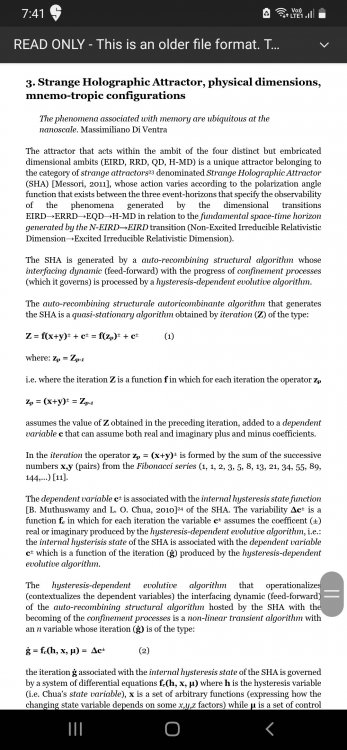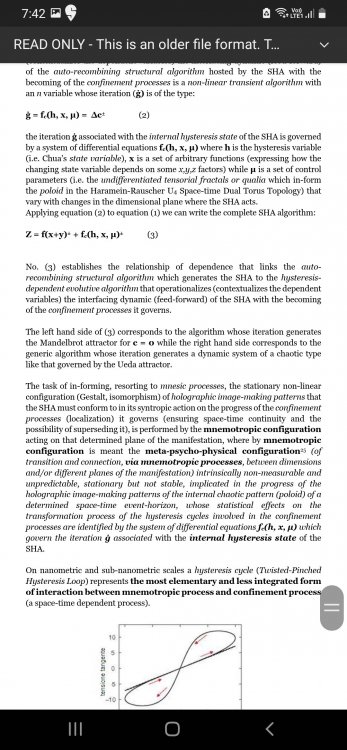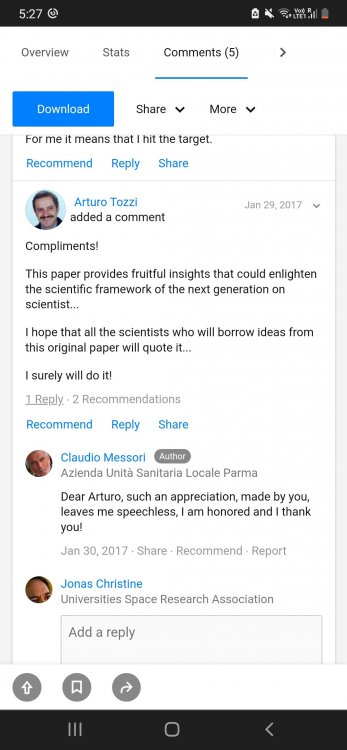-
Do the equations for the strange attractor make any sense?
- Do the equations for the strange attractor make any sense?
Hey in the following paper there are some equations relating to a strange attractor , the equations i cannot seem to find anywhere else. My question is whether these equations make sense whatsoever? In section 3 there are some equations regarding a 'strange attractor' . Do those equations make any sense whatsoever- Could someone give me an appropriate criticism for this?
Well said- Could someone give me an appropriate criticism for this?
I actually had another doubt, I saw that in one of his papers he describes interference correctly, yet he goes on to write nonsense like what you just read... does this in any way lend credibility to his claims as such?- Could someone give me an appropriate criticism for this?
I actually saw this definition of energy:- First step. General Relativity can be considered a relationship theory in which the only relevant fact under the physical profile is the relationship between different events in space-time. - Second Step. In Aristotele by "dynamis" is meant the "potency" correlated to the "action" (energheia), efficient cause connected to the movement and its quantitative and qualitative effects, the "inherent potency" or intrinsic possibility of a body to be translated in an action (energheia) that may be realized or not, a value of reality only possible with respect to the real action realized. The mathematician and philosopher Arthur M. Young recognizes the "action" (energheia) its fundamental causative value deriving it from the notion of "quantum of action" as formulated by Planck: " Let us also note that the purposiveness is associated with that aspect of light known as the principle of action (or least action). (….) What did Planck add to this principle of action that was not already present in the ideas of Leibniz? It was the notion that action comes in quanta or wholes, and that this unit is constant. Note that despite the tendency to refer to energy as quantized – a habit which even good physicists are given to – it is not energy but action that comes in wholes. Action = E x T (Energy x Time) = Constant (h) Action is constant, energy is proportional to frequency. (T is the time of one cycle.) (….) Wholeness is inherent in the nature of action, or decision, of purposive activity. (….) While mass is measured in grams, length in meters, and time in seconds, quanta of action are counted with no necessity of specifying the kind of unit. This implies their fundamental nature; actions precede measure, they are prior to the analysis which yields grams, meters, and seconds. It might be objected that action has the measure formula ML^2/T and hence cannot be dimensionless. The answer is that, though action has the dimension ML^2/T, we are taking the position that this particular combination of dimensions (known as action) is the whole from which time, mass, and length are derived. The reasons are as follows: 1. Action comes in irreducible quanta or units. 2. These units are of constant size, i.e., invariant. 3. They are counted, not measured. 4. Because indeterminate, they constitute the end point in the chain of causation and are therefore a first cause. (Source: http://www.meru.org/coast/Arthur Young-LightAndChoice-RefUniv.pdf) - Third step. With aim of unifying gravitation and quantum mechanics, in 1924 Arthur Eddington proposed as an alternative to the "gravitational action" of Einstein-Hilbert ("action" which in astrophysical environs describes how gravity emerges from the curvature of space-time in the presence of matter and energy), a "gravitational action" that is valid in the absence of matter (i.e. a vacuum). The recent re-elaboration of Eddington’s gravitational action, carried out by the astrophysicists Maximo Banados and Pedro Ferreira (http://arxiv.org/pdf/1006.1769.pdf), led to a hypothesis that at the time of the Big Bang space-time was not continuous but was characterized by a minimum length, a non-continuous space-time that excludes the idea of the Universe as a singularity and which, consequently, leads to elimination of the necessity to turn to the very concept of singularity. Conclusion. The energy is the ability to generate interference, ability generated by perturbative relativistic phenomena, perturbation which triggers the transition from "inherent potency" to "quanta of action / gravitational action". " Does this make sense? I'd recommend you read it completely so it is understandable. PS Same author- How does one know how much a author contributed to a paper?
I HAVE FOUND MY RESPONSE TO THE FOLLOWING .- Could someone give me an appropriate criticism for this?
Lmao I messaged arturo. Guess what he says :- 'To be honest, I wrote all that to Claudio messori just because he is my friend. I like him, but I do not agree with his thinking '- Could someone give me an appropriate criticism for this?
Why do you think he recommended it tho? Why do you think good scientists recommended bad science? Specially arturo tozzi? He has worked with Karl friston a famous neuroscientist, yet he chose to recommend bad science. Is it some mistake in our thinking or are they just dumbos.- How does one know how much a author contributed to a paper?
He actually recommended Claudio Messori that's why I asked, see the old thread- Could someone give me an appropriate criticism for this?
https://www.researchgate.net/publication/310270653_Intelligence_vs_Artificial_Intelligence_The_King_Is_Naked/comments I actually saw this other article from the same dude Claudio and I saw that this guy named arturo tozzi said his paper was good. Essentially it's the same orignal paper as the beginning. But why do you think he recommended it? And he's not just some other guy. He looks like he has worked with Karl friston Joigus what u think of this- How does one know how much a author contributed to a paper?
So I saw this paper by Arturo tozzi https://www.researchgate.net/publication/297679077_Towards_a_Neuronal_Gauge_Theory So I wanted to know how much this arturo contributed to his work? So I saw papers he has written on the same but hen I saw he abuses self citation, from a paper on 94 citation he has 84 or 87 being self. Sane with most of his other papers. However the one I linked above has about 50 odd self citations but he has contributed to the paper with other authors so that's what I was confused about. Whether the guy really has any expertise in the field he is commenting in?- Could someone give me an appropriate criticism for this?
So this means that the author doesn't have the expertise in his field and is just living on other people's research right?- Could someone give me an appropriate criticism for this?
Lol. Congrats Exchemist- Could someone give me an appropriate criticism for this?
Ya'll won't believe what I found. The entire section on coherence domains has been copy pasted from this paper;-https://www.semanticscholar.org/paper/Quantum-Coherent-Water-%2C-Non-thermal-EMF-Effects-%2C-Ho/071e91e34a1245ee505888d9bca715d7e8facdde The entire section doesn't belong to him. He's copy pasted it and changed some words in between. I haven't checked the other sections ( i will shortly in a week or so) but when Swanson told me this sentence "QfT explicitly recognizes an extended VEMF......" I just pasted it google and found this article. My suspicions are correct.- Could someone give me an appropriate criticism for this?
Emilio Del Giudice and his Wikipedia page. However do you stand by your opinion that the orignal article is loads of bunk? my confusion is how one can produce a good paper and then produce nonsense.... Also here is the paper by Vladimir voeikov on the orignal author :- https://www.researchgate.net/publication/351627720_Physicochemical_Effects_of_Humid_Air_Treated_with_Infrared_Radiation_on_Aqueous_Solutions I also did some digging on the Vladimir fellow and found that the guy supports homeopathy:- https://www.researchgate.net/publication/340332550_Disperse_and_Dissipative_Nature_of_Aqueous_Systems_-_a_Possible_Foundation_of_Homeopathy Further questions:- Because the vladimir is somehow advocating FOR homeopathy, would it be fair to dismiss whatever he says as bunk? - Do the equations for the strange attractor make any sense?
Important Information
We have placed cookies on your device to help make this website better. You can adjust your cookie settings, otherwise we'll assume you're okay to continue.



